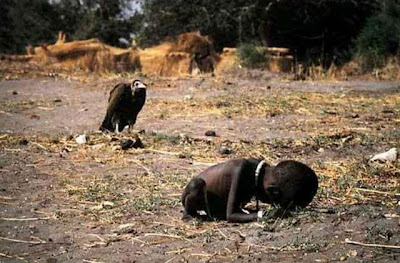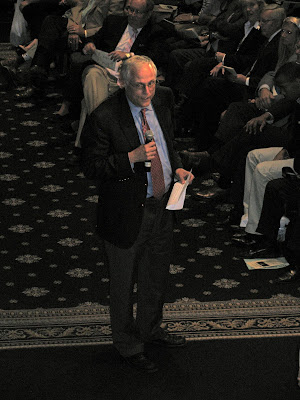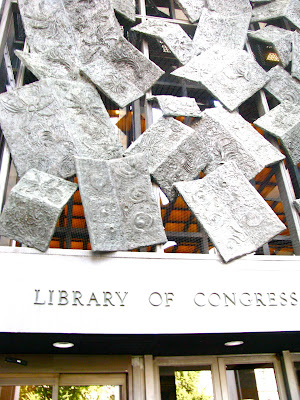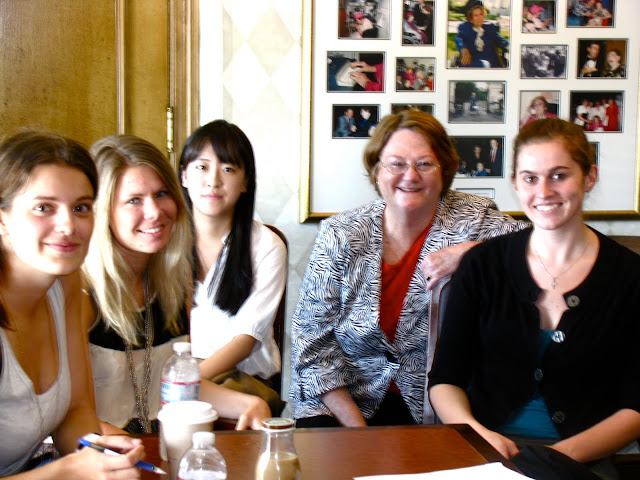 |
| Newseum Professor and class members |
Our "professor" (a Newseum employee) first showed us a photo and asked us if we would choose to publish it. It was a blurry, somewhat obscure photo, in which three soldiers stood upon a small hill, one obviously wounded (the bright red blood serving as the telltale sign of injury, though what exactly had happened was unclear).
Our class argued a little, debating whether or not it would be ethical to publish a graphic photo such as this.
After a little bit of time, she revealed to us that the man was 21-years old, and a soldier in Afghanistan. He had, in fact, been mortally wounded - and died hours later at the hospital. When the AP wanted to publish this photo, his family became furious and the U.S. Secretary of Defense even called the AP President to discourage him from going through with it.
However, the point of the exercise was to show that journalists have to exercise their better judgment in the release of information, because if we left it up to the First Amendment, most things would be allowed to be published.
In the end, the AP decided to leave it up to its individual distributors to decide whether to publish the photo or not.
Here's the photo:
The class ended with an exercise in which each group received a scenario and had to decide what they would do in each instance.
Ours was something along the lines of "You're a photojournalist in an impoverished country and have been observing a starving community, the members of which you have been ordered not to touch for reasons of disease transfer. You see a small starving child, next to which a vulture sits, staring intently at the child. You know this is a once in a lifetime shot, even if what you are showing is arguably inhumane and provocative."
Do you...
A.) Take the photo of the vulture and the child - it is too powerful of an image to pass up .
B.) Put the camera down, shoo the vulture away and call for help
C.) Take the picture of the child but leave the vulture out.
We picked A and B. Take the photo, shoo the vulture - our reasoning being that you can't save one child, but your photo may be so moving that it brings attention to the town, which could eventually save it.
It was a fairly sobering activity, kind of setting the mood for the rest of the visit. We then all filed into the museum, a collection of exhibits spanning 6 floors. There's a section for 9/11, Katrina, journalist deaths, Pulitzer Prize winning photos, and much much muchooo more.
I didn't get through much, however, because after the first exhibit or two, I started to feel sick. It really felt like the museum was fanning the flames of voyeurism - just perpetuating the fact that humans have this sick fascination with observing death and destruction.
I understand that a large part of journalism is covering national disasters and tragedies - so it makes sense that the Newseum would cover our nation's worst historical events. That being said, knowing this doesn't make much of a difference when you're looking at the 50th dead body, burning victim, starving child, impending death or family in ruins.
After an hour or so of gazing at devastation of a disconcerting variety, I headed on down to the 4-D theatre - a fabulous way to end the visit, might I add.
I literally shrieked at one point, convinced that a Revolutionary War musket bullet was inches from shattering my face.
Even though the substance of the film was questionable, the experience was definitely more fun than staring at bodies falling out of buildings or into rivers or fires or whatever other horrific end might await them.
And on that cheerful note, I leave you.
Cheers.
 |
| View from 6th floor terrace |
 |
| Vilde in her 3D glasses, prepping for 4d flick |
 |
| view 2 from 6th floor terrace |














































